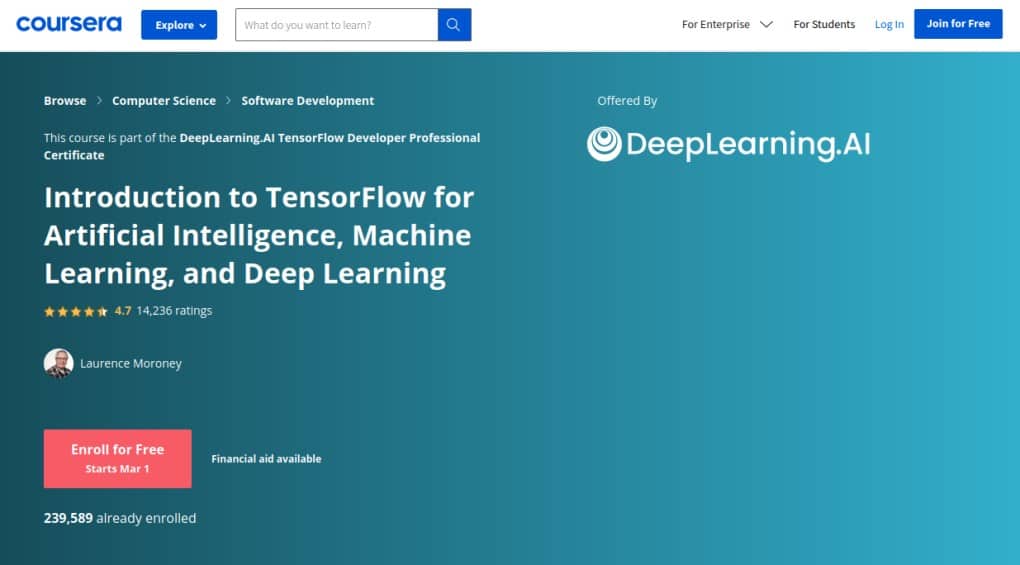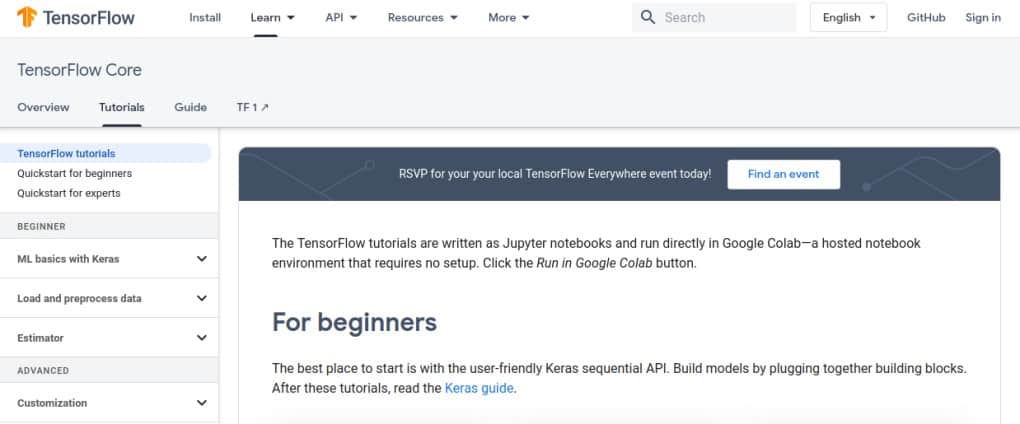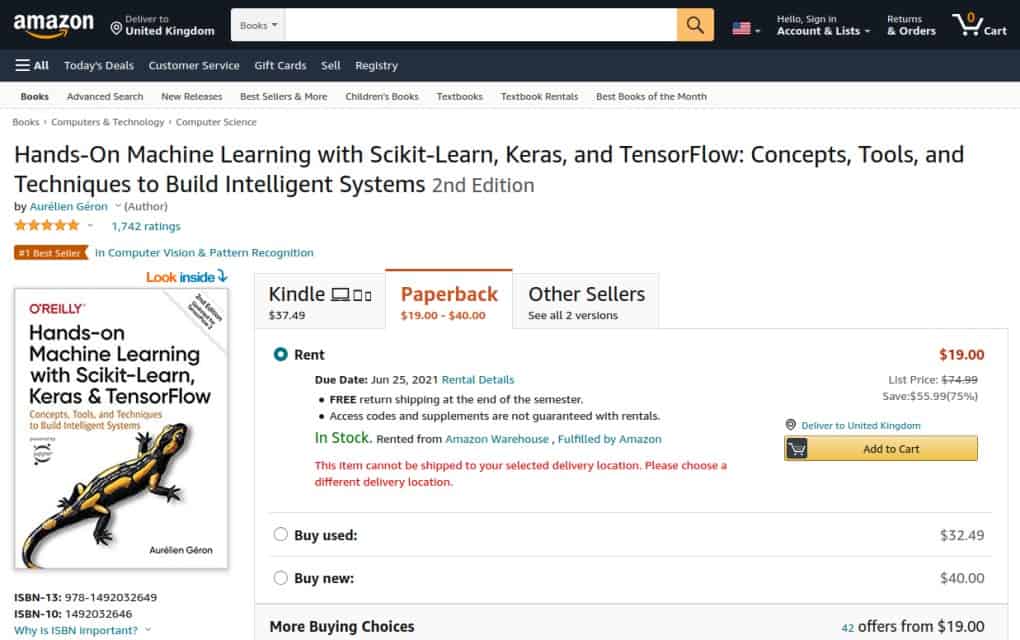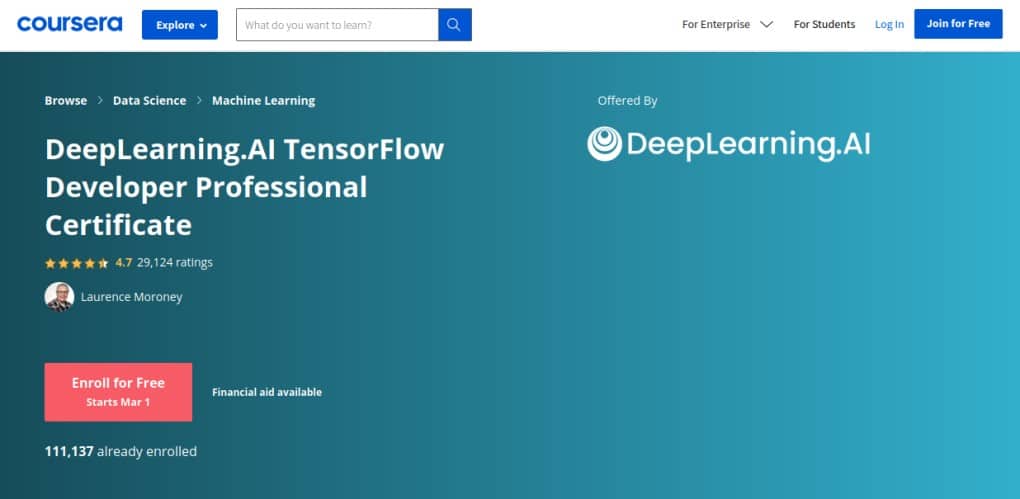
How to Learn TensorFlow
Most discussions about machine learning tools end up mentioning TensorFlow, a tool developed by Google. This tool, used by beginners and experts alike, comes with a range of libraries that are useful for machine and deep learning.
In this guide, we show you how to learn TensorFlow. We begin by discussing what you need to know about this tool. Next, we tackle the best resources to learn this tool and answer the common questions that come up when learning TensorFlow.
What You Need to Know About TensorFlow
TensorFlow, which is now in version 2, has an extensive range of features for machine learning applications. As a result, there is quite a lot for you to learn. To help you figure out where to begin, here is a list of essential concepts for beginners:
- Using Keras: TensorFlow is often used in conjunction with Keras, a Python deep learning API. You should build a good understanding of Keras to properly master TensorFlow.
- Loading Data: You should learn how to load data into a TensorFlow program and prepare (clean) the data so that it is ready to be used in your application.
- Building a Model: After you feel comfortable with Keras and loading data, you should start learning about machine learning models and when they are used. You should then learn to build a model for yourself.
- Neural Networks: Spend time learning about the different types of neural networks such as Convolutional Neural Networks and Recurrent Neural Networks. You will need to know how to implement each of these neural networks in TensorFlow.
- Saving Models: You should become comfortable with checkpoints and the SavedModel method to save the machine learning models you have created.
The five points above simply give you a place to start; they’re not meant to be the complete syllabus. TensorFlow has a lot of methods that you can learn. However, as a beginner, there is no need to learn everything about the language. Instead, focus on the fundamentals and then work your way into more advanced concepts as you go.
In terms of specific concepts you should look up, consider researching:
- TensorFlow and Keras
- Customization
- Performance
- Implementing trees
- Distributed training
- Working with text, images, and audio
- RNNs and CNNs
With an understanding of these topics, you will be on your way to becoming proficient in TensorFlow.
Skills Needed to Learn TensorFlow
To become proficient in TensorFlow, there are a few skills you will need:
- An understanding of a programming language (e.g. Python).
- A strong understanding of statistics, algebra, and mathematics.
- A background working with machine learning.
These three skills are all necessary because TensorFlow is a framework for implementing machine learning, which itself is based on programming and mathematics.
Without the right background knowledge, you will struggle to comprehend many of the methods offered by TensorFlow. Make sure you learn a coding language and brush up on your math and machine learning knowledge before attempting to learn TensorFlow.
Why You Should Learn TensorFlow
TensorFlow is used extensively in machine and deep learning. As a result, if you want to pursue a career in either of these fields having a strong understanding of TensorFlow is incredibly valuable. There are other tools used in machine learning, like PyTorch or Keras, but TensorFlow has proven its value as a core machine learning technology.
TensorFlow was developed by Google to enhance their own machine learning projects. The library has been designed for machine learning development, so you are likely to find a lot of the tools you need to build detailed machine learning algorithms. TensorFlow is fast and efficient, which is important for machine learning programs because they often deal with massive datasets.
Overall, TensorFlow will become an important tool in your machine learning arsenal.
How Long Does it Take to Learn TensorFlow?
If you have some Python and machine learning knowledge, expect to spend a few days learning the basics of TensorFlow. You can reasonably start to build some more intricate models with TensorFlow within a few weeks of study as long as you feel comfortable with Python and the basics of machine learning. To learn enough TensorFlow for a job in machine learning, you will probably need to spend between six and twelve months practicing and refining your skills.
Learning TensorFlow will take more time if you are not familiar with Python or machine learning. Knowledge of both of these fields is essential for understanding TensorFlow. We recommend studying the basics of Python and machine learning before you approach TensorFlow.
Learning TensorFlow: A Study Guide
There are plenty of resources online that teach TensorFlow. With so many courses and tutorials out there, the hard part is finding a resource that is right for you.
Below, we have listed some TensorFlow resources that are good for beginners and those with only limited TensorFlow experience:
Introduction to TensorFlow for Artificial Intelligence, Machine Learning, and Deep Learning By DeepLearning.AI on Coursera

- Resource Type: Course
- Price: Free
- Audience: Beginners to TensorFlow. Python and high school math knowledge are required. Machine or deep learning knowledge is preferred, but not required.
This course is taught by Laurence Moroney, a lead AI expert at Google. It was developed in cooperation with the prestigious DeepLearning.AI organization. Andrew Ng, a machine learning specialist, also teaches this course.
Here, you will learn the basics of TensorFlow and machine learning. You will build a neural network for a computer vision tool and learn how to improve a neural network. This course takes about 30 hours to complete.
Intro to TensorFlow for Deep Learning by TensorFlow (on Udacity)

- Resource Type: Course
- Price: Free
- Audience: Beginners to Tensorflow
This course, developed by the TensorFlow team, walks you through the basics of machine learning and neural network development using TensorFlow. You will start by learning about AI and machine learning and then delve into building a model that recognizes images of clothing.
Toward the end of the course, you will learn how to save and load machine learning models and use time-series forecasting. This course is taught by industry professionals and features interactive exercises to refine your knowledge of TensorFlow.
Official TensorFlow Tutorials

- Resource Type: Tutorials
- Price: Free
- Audience: Beginners to TensorFlow (expert tutorials also available)
The official TensorFlow tutorials are a good place to start learning TensorFlow. Starting with a simple “Hello, World!” example, you will learn how to construct a TensorFlow program. There are guides on image classification, text classification, loading and preprocessing data, and more.
Once you have built a good understanding of TensorFlow, you can move onto the more advanced tutorials which cover topics like distributed training and customization.
Hands-On Machine Learning with Scikit-Learn, Keras, and TensorFlow, 2nd Edition

- Resource Type: Book
- Price: $32.49
- Audience: Beginners
This book was written to teach you how to use scikit-learn and TensorFlow, both used extensively for machine learning programs written in the Python language.
In this book, you will learn some fundamental machine learning terminology, neural net architectures, training methods, and more. The book is full of examples that you can use to practice your TensorFlow skills.
DeepLearning.AI TensorFlow Developer Professional Certificate

- Resource Type: Course
- Price: Free
- Audience: Intermediate TensorFlow developers
This course is good for people who already have a basic understanding of TensorFlow but want to advance their skills. You will learn about TensorFlow best practices. It covers natural language processing, RNNs, LSTMs, image data, GRUs, and more.
This course is taught by DeepLearning.AI and can help prepare you for the Google TensorFlow Certificate exam. This exam certifies you as proficient in using TensorFlow for complex deep learning and machine learning problems.
Communities for People Studying TensorFlow
There are several online communities that discuss TensorFlow. Communities are a great place to turn when you have questions or if you have a project you want to show others. You can also use communities to share your knowledge by helping other developers solve the issues they are facing.
To help you find one that’s right for you, we have compiled a list of three top TensorFlow communities:
TensorFlow User Groups
TensorFlow user groups are an opportunity to interact with people who are in the same city or region as you. There are user groups in Africa, the Americas, Asia, Europe, and Oceania that you can join, many of which have open registrations on Meetup.com.
These groups are for anyone interested in TensorFlow, from beginners to experts, so don’t worry about not having enough knowledge. You can join one and start interacting with people right away.
TensorFlow Stack Overflow Forum
There are over 67,000 questions on the TensorFlow Stack Overflow forum, which is incredibly active. In this forum, you will find answers to questions about TensorFlow, ranging from common concerns to more specific issues and debugging-related inquiries.
This forum is a great place to go with technical questions. You can read existing answers or ask your own question if you cannot find the answer to a problem you have.
TensorFlow Kaggle Community
The TensorFlow Kaggle community is a forum where users chat about their projects, share tips, and discuss anything related to TensorFlow. You will find threads on topics like how to speed up your training, using time series RNNs, and more.
TensorFlow Blog
The official TensorFlow blog features posts on various aspects of TensorFlow, from the community to using TensorFlow.js, the JavaScript implementation of TensorFlow. On the blog, you will find tutorials, example use cases, community updates, and more. Some of the tutorials include code snippets so you can follow along with what you read at home.
How Hard Is it to Learn TensorFlow?
TensorFlow is quite a difficult technology to learn. To use TensorFlow efficiently, you will need to have a good understanding of mathematics, Python, and machine learning. But after a few weeks of practice, you should feel comfortable using the technology for basic projects. If you go on to use TensorFlow for more advanced projects, you will encounter even more difficulties.
The key is practicing your TensorFlow skills as much as possible. Practice whenever you can and try to get feedback on your work so you can improve your code.
Will Learning TensorFlow Help Me Find a Job?
Machine and deep learning jobs, where TensorFlow is more likely to be used, are on the rise. As a result, the career prospects for someone who has a strong understanding of TensorFlow are promising.
To illustrate how TensorFlow may impact your career in machine learning or deep learning, here are a few figures from Glassdoor and the US Bureau of Labor Statistics:
- Salaries: Glassdoor reports the average machine learning engineer based in the United States earns an estimated $114,121 per year, an impressive sum.
- Job Openings: There are, at the time of writing, 19,431 jobs open on Glassdoor for machine learning engineers.
- Industry Growth: Jobs in computer and information research science, which include machine and deep learning developers, are expected to grow 15% between 2019 and 2029, which is “much faster than average.”
These statistics show that a career in machine or deep learning, where TensorFlow skills are valued, can pay well, and that these industries are expected to grow in the future.
Conclusion: Should You Learn TensorFlow?
TensorFlow is used to build machine learning applications. The tool was developed by Google for their own machine learning projects and was then open-sourced. TensorFlow is favored by developers because it is efficient and offers a range of features that are useful in machine learning applications.
You should spend some time thinking about whether you’re interested in a career in machine learning. Are you good with numbers? Do you like coding? Do you find solving difficult problems interesting? If so, perhaps learning TensorFlow would be a good idea. But before you do, make sure you have some knowledge of Python and machine learning. This knowledge will set you in good stead as you start to learn TensorFlow.
Good luck in your learning journey!


